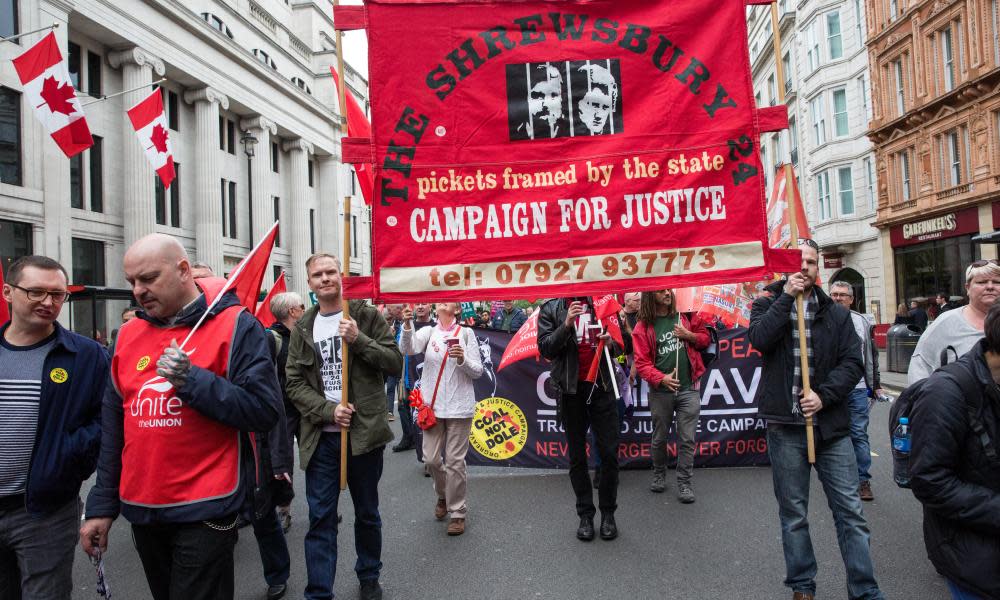Shrewsbury 24: how industrial action led to 47-year fight for justice

The industrial action that led to the convictions of union activists and a 47-year campaign to clear their names took place as Edward Heath’s Conservative government sought to weaken the economic power of trade unions.
The activists decided in September 1972 that they would launch the first building workers’ strike in the UK against low pay and dehumanising conditions across sites around Shrewsbury. At one building site, hundreds of workers were expected to share a single, rat-infested toilet, activists claimed. There was nowhere for builders to change into dry clothes; if it rained, workers stayed wet all day or lost pay if they went home to change.
Related: Shrewsbury 24: court of appeal overturns 1970s picketing convictions
Those activists included Ricky Tomlinson, who later became an award-winning actor and star of the BBC comedy The Royle Family. They hired six coaches and picketed large sites around Shrewsbury, accompanied by police officers. None were arrested at the time and the strikes passed peacefully.
Five months later, those involved in the action were caught cold when they were arrested and charged with offences including “conspiracy to intimidate”. Two of the 24 activists charged were subsequently cleared, but the others were convicted. Tomlinson, then known as Eric, received a two-year sentence and was held in solitary confinement after refusing to work or wear clothes.
Des Warren, another strike organiser, received a three-year sentence. His family has claimed he was regularly made to drink a cocktail of tranquillisers while in prison which led to Parkinson’s disease and may have been a contributory factor to his death in 2004.
Many of those convicted also found that upon their release they had been blacklisted and were unable to work. For nearly half a century, the families of the convicted men, backed by trade unions, have campaigned for their convictions to be quashed.
They have maintained that the government colluded with the police and the security services to ensure convictions – a claim that was not backed by a ruling on Tuesday that overturned the criminal convictions of a group.
Last year the Criminal Cases Review Commission, the official body that looks at potential miscarriages of justice, sent the case back to the court of appeal after Eileen Turnbull, a researcher for the justice campaign, uncovered a potentially crucial document in the National Archives.
That document, part of prosecution papers, revealed for the first time that police had destroyed some of the original witness statements.
Danny Friedman QC, speaking for 12 of the men, told the court of appeal that these missing original statements would have been crucial. “If today a prosecution counsel is told by [police] officers … original statements have been destroyed, two things absolutely have to happen.
“Number one, you need to immediately get a statement from the officer in the case, explaining in detail what on earth he is talking about. Secondly, you must also make sure that this issue is disclosed to defence and the judge.”
After Tuesday’s ruling, Terry Renshaw, who was convicted in 1973 of unlawful assembly, paid tribute to Turnbull, who he said had worked tirelessly to obtain the crucial evidence.
“It’s been 47 years. I’m just so emotional. I didn’t think it would hit me like this. I am no longer a criminal,” he said.

 Yahoo News
Yahoo News 
